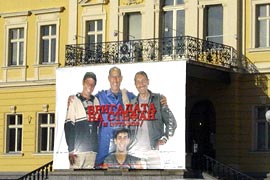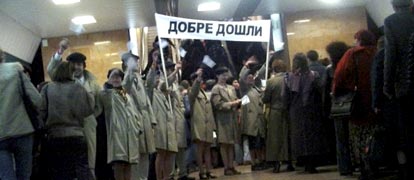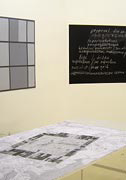|
|



FormatsAnalyses of contemporary urban visual culture using the example of Sofia: Forum "Visual Culture", Resident Fellows Program, international Guest Program "Visual Statement", exhibitions, publicationsProject leadershipIara Boubnova, Institute of Contemporary Art (ICA), SofiaLeadership of the Fellows ProgramAlexander Kiossev, Center for Advanced Study in Sofia (CAS)TeamMaria Vassileva, Iskra ZaharievaAdvisory boardLuchezar Boyadjiev (artist, Sofia)Ivaylo Dichev (cultural anthropologist, Sofia) Irina Genova (art historian, Sofia) Boyan Manchev (literary theoretician, Sofia) Miglena Nikolchina (philosopher, Sofia) Diana Popova (art critic, Sofia) Kiril Prashkov (artist, Sofia) Nedko Solakov (artist, Sofia) Orlin Spassov (expert in the area of print and visual media, Sofia) FellowsLuchezar Boyadjiev, Milla Mineva, X-TENDO, Krassimir Terziev, Boris Missirkov/ Georgi Bogdanov, Georgi Gospodinov, Svetla Kazalarska, Ivan Moudov, Yavor GardevGuests / artistsGelatin, Olaf Nikolai, Sean Snyder, Birgit Brenner, Christine de la Garenne, Ulrike Kuschel, Via Lewandowsky
|
Nowadays one witnesses a new visual wave: the previously dominant culture of the public image and the "society of the spectacle" (Guy Debord) are gradually being changed by the new complex structures of the "display," "interface," "billboard," and "scanned-and-sent" images. Together with home video, the video clip, and post-MTV culture, and with the expansion of design, lifestyle, and fusion cultures, the new visual-digitalized hybrids are saturating everyday life. The "Visual Seminar" deals with contemporary visual culture in so-called transitional societies. We want to have the changes taking place in urban space - and so the visual culture and the schooling of sight understood - as political issues. It is our intention to influence the cultural policies in our country through debate, and, thereby, increase public literacy in the field of "visuality."Images of the City, Images of CapitalIn Bulgaria, bureaucrats and "post-official" artists are still using and misusing the old visual codes in favor of aggressive neo-nationalism and premature anti-globalism. In addition, the mass media, frequently populist in its actions and itself easily manipulated, often circulate poor (and politically incorrect) imagery, feeding on both the outdated communist legacy and the no less propagandistic visual world of consumer society. In this unfriendly context, the creative and innovative codes of contemporary art - with its capacity for mixing and transgressing systems of values, for aggressively breaking taboos, for creating new objects of desire, for deploying ironic quotations and for playing with complexity - is confronting a deficit of deciphering. The broad public in Bulgaria has great difficulty even "reading" the new artistic visual messages. This is one of the key reasons why the visual arts in Bulgaria have yet to achieve a significant public impact. To remedy the situation, we are staging regular public debates and promoting cooperation between artists and scholars within the framework of our fellowship program, conducted at the Centre for Advanced Study in Sofia (CAS) under the direction of Alexander Kiossev. The topics dealt with in the public debates, in part co-organized by the resident fellows, that have been held within the "Visual Seminar" up until now were: "Images of the City, Images of Capital," "Debates between the Visual Left and the Visual Right," "Philosophy of the Visual in the City," "Language in Public Space," and "Clichés of the Visual and the Word in Urban Space." Taking part in the forums are architects, city councilors and municipal decision-makers, investors and an interested public from the city of Sofia. The forums are accompanied by intensive press work. In 2004, the "Visual Seminar" awarded for the first time a prize - a mirrored raspberry - for Sofia's most superfluous building. More than 200 persons cast their vote either via the internet or directly on site. We have also founded a "Discussion Club on Demand." The audience determines the topics and, upon demand, the "Visual Seminar" organizes the infrastructure and the moderation. Furthermore, another central module for us is to curate exhibitions and promote art actions in a public space. For instance, the resident fellow Krassimir Terziev played his video work on all the screens of the Sofia subway. His project continued with the exhibition "From Toward to Here." All the works of the fellows (4 per year) are documented in individual publications.Iara Boubnova |
